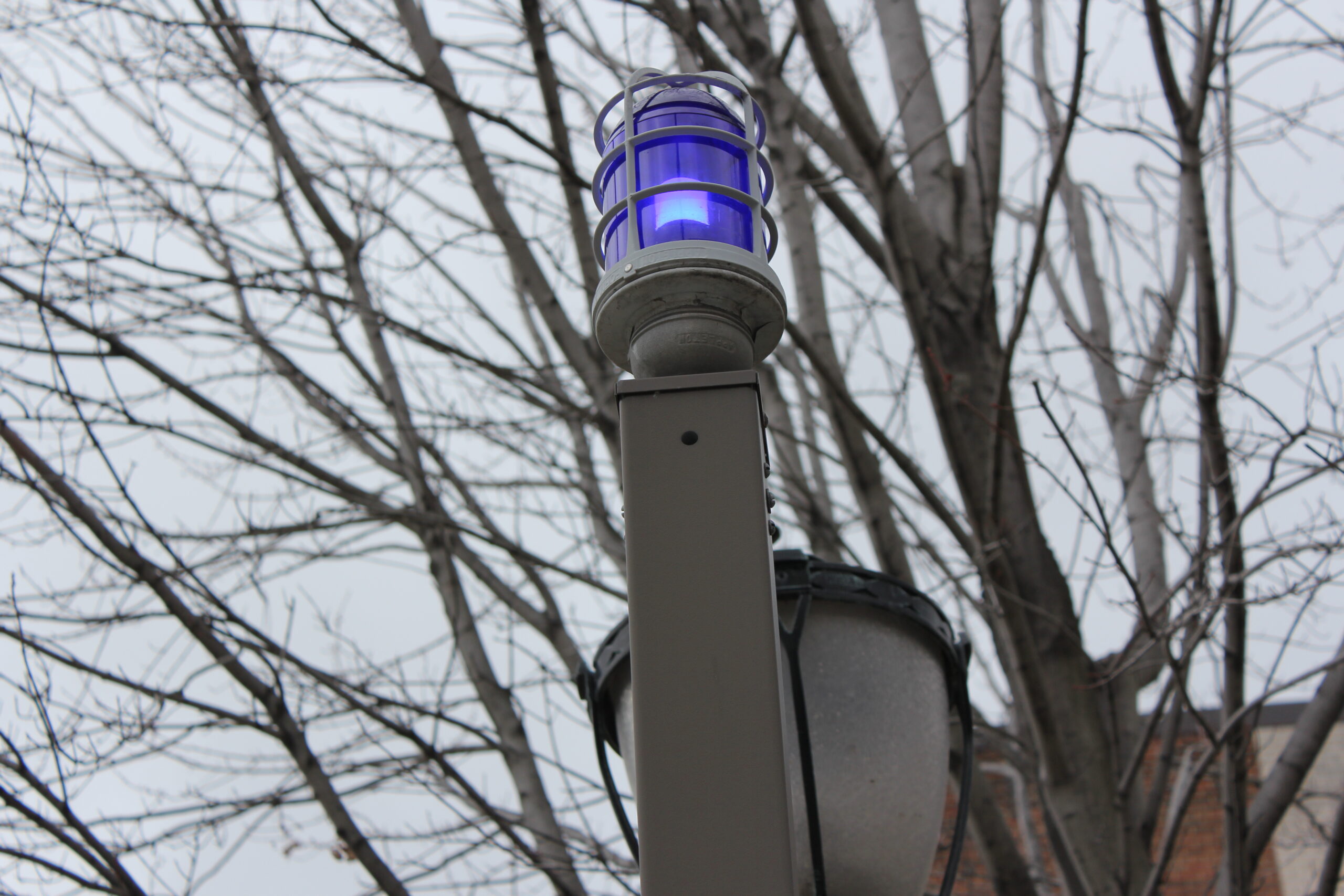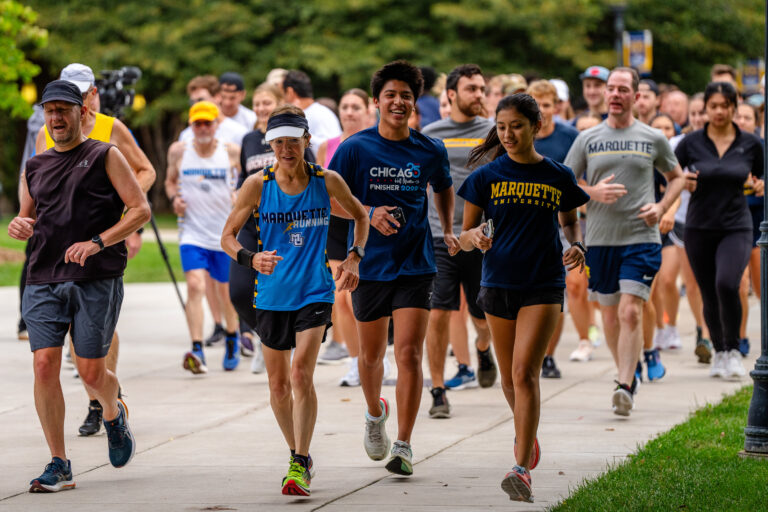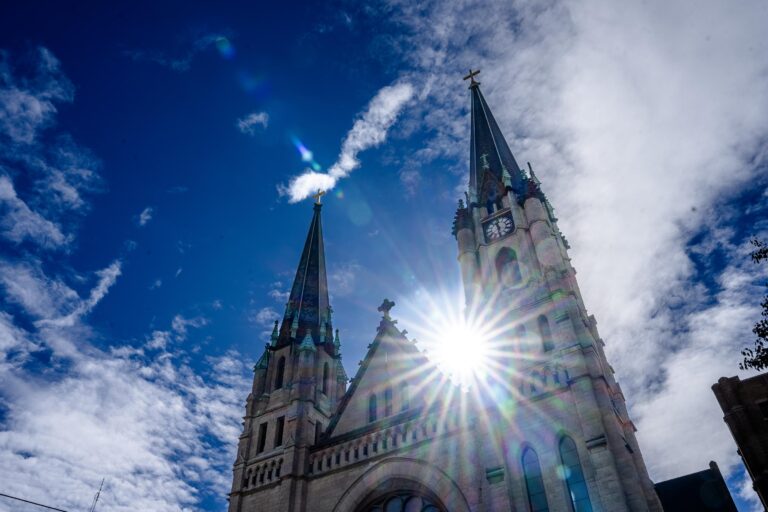During the last few weeks, the President’s Task Force on Community Safety received many questions through its idea submission portal pertaining to the current state of university safety infrastructure, processes and programs. As the Safety Task Force develops additional recommendations following the initial actions announced last week, the group wanted to respond to the most frequently shared questions regarding the university’s current safety and security resources.
ENVIRONMENT AND SECURITY TECHNOLOGY
Does the university have cameras? How many?
There are 1,219 video cameras located throughout campus and in the near-campus neighborhood. They are linked to the Command Information Center in MUPD and are used to help monitor suspicious behavior and document activity in a given area. Installation of more cameras was announced last week.
How many Blue Light phones are there?
More than 450 Blue Light phones are located throughout campus and in the nearby neighborhood. Blue Light phones have cameras that are always recording. By picking up the phone, a caller is connected with MUPD immediately.
What kind of safety equipment is active in Marquette parking structures?
Surface lots and parking structures have cameras and are patrolled by public safety officers and police officers. In both parking structures 1 and 2, cameras are on each floor of the structure as well as in the elevator lobbies. There are also panic buttons in every stairwell landing that connect directly to the Command Information Center in MUPD.
Does Marquette consider environmental design strategies to deter crime?
The university balances measures that ensure our urban environment is active and vibrant while also being safe. Known as Crime Prevention through Environmental Design (CPTED), this multi-disciplinary approach uses urban and architectural design and the management of built and natural environments to deter potential offenders, while building a sense of community and control. Examples include more lighting, landscaping, traffic mitigation strategies, restricted parking, building access control and surveillance cameras.
POLICE
How large is the Marquette University Police Department?
Chief Edith Hudson leads more than 80 trained public safety professionals, including 44 sworn law enforcement officers, who deliver an extensive safety infrastructure throughout campus and in the near-off-campus neighborhood. As a commissioned police force, MUPD has the authority to protect campus, make arrests and issue citations.
Where does MUPD patrol?
MUPD’s patrol zone is extensive and exceeds campus boundaries. The patrol zone is generally bordered by:
- Highland Ave. to the north
- N. James Lovell and 6th Streets to the east
- 24th Street to the west
- Canal Street to the south
MUPD and the Milwaukee Police Department frequently collaborate on investigations near patrol borders.
SAFETY ALERT TEXTS AND EMAILS
When does MUPD send safety alert text messages and emails?
A safety alert text message is only sent if there is an active threat to campus or if there is a significant police presence. Occasionally an alert may be sent if there is a building issue. Text alerts inform the campus community of immediate action steps that will preserve safety. For example:
- Use caution: If you are in the area, use caution and be aware of your surroundings.
- Avoid area: Stay away from the area.
- Shelter in place: Stay where you are until an all clear is given.
- Evacuate: Evacuate the building you are in immediately.
- Run, Hide, Fight: If you can safely leave the area, leave. If you are unable to leave the area safely, find a safe and secure location to hide. If you are left with no other option, use materials at your disposal to fight the active threat.
When more information is known as MUPD investigates, a follow-up email is sent that includes suspect and vehicle descriptions, if applicable. This information encourages people to avoid a certain area and watch for suspects who match the description. All Safety Alert emails are posted online in Marquette Today, and alerts may be updated with new information if and when it becomes available.
Because MUPD is a commissioned police force, it responds to many incidents each day that do not pose a threat to campus and, therefore, do not warrant a text alert. MUPD keeps a daily log of all crimes or serious incidents that occur within its patrol boundaries. Learn more about daily log information.
Why do students, faculty and staff receive safety alerts?
Marquette University complies with the Jeanne Clery Act which requires colleges and universities to report campus crime data, support victims of violence and publicly outline the policies and procedures they have put into place to improve campus safety. MUPD’s patrol zone includes neighboring communities and the university, so this process is in place for those who live and work at the university.
Who can receive MUPD safety alert text messages and emails?
All students, faculty and staff are automatically opted into the text messaging system as long as their mobile phone numbers are up-to-date and labeled as a mobile number in CheckMarq for students or in MyJob for faculty and staff. (Faculty and staff with university-owned cell phones will automatically receive text alerts.) Please ensure your device settings are not blocking mass notifications or emergency notifications.
- Students: Make sure you’ve entered your cell phone number in the “Personal Information” section of CheckMarq.
- Faculty and staff: Please go to MyJob to add or update your mobile phone number for text alerts.
Why don’t parents receive the safety alerts?
Currently the text alert system serves students, faculty and staff. Parents can download the EagleEye app to receive safety alerts (the same information as the text alerts) as long as their push notification settings are turned on. All safety alerts are also shared via the MUPD Twitter account.
SAFETY RESOURCES AND TRAINING
What does the EagleEye app do?
The EagleEye app hosts many safety resources, and anyone — including parents and neighbors — can download it via the App Store or Google Play. Location services must be enabled and push notifications allowed for full functionality. In addition to housing maps, emergency procedures and providing support resources, the app offers important real-time services:
- Safety alert push notifications: These are the same notifications received via text. You must have your push notification settings on for the app to receive these.
- Transportation locator for LIMO Express: When the “Campus Safety” setting is on, this map shows all active Limo Express vehicles and the directions in which they’re traveling, making it easier for riders to anticipate when a shuttle will arrive at a particular route destination.
- The white LIMO Express vans drive a set route throughout campus and handle more of our off-campus transports. Blue LIMOs are not restricted to a set route and are the ones responding to requests called into dispatch at (414) 288-6363.
- Remember that LIMO Express routes are active from 4 p.m. until 3 a.m. every day and will only appear on the map during operating hours.
- At present, the map does not include information for dispatched LIMOs.
- Mobile BlueLight: By tapping a button, MUPD will be dispatched to your device’s location to immediately respond.
- Friend Walk: This allows you to send your location to a friend so the friend can ensure you get to your destination safely or call emergency services if they are concerned. When you finish your trip, disconnect, and it will stop tracking.
Note that MUPD does not track devices with the EagleEye app installed. Device location information is only shared with MUPD when a Mobile BlueLight communication is activated, and, even then, MUPD does not have a name associated with the device.
Does Marquette offer self-defense and other safety training?
MUPD offers many protective services and programs to protect self and property.
Trainings:
- Student orientation: Each year, MUPD participates in student orientation to introduce the students to MUPD with a brief presentation of who we are and what we do. In addition, we provide general safety tips and explain the available training programs.
- Self-defense: The free self-defense program combines a hands-on approach to learning effective techniques with information about the latest national and local crime trends. Designed for female and male audiences, the class incorporates simple strategies for escaping potentially dangerous situations.
- Personal security: Personal Security Awareness training reviews steps to take to limit exposure to personal and environmental security risks.
- Active shooter training: MUPD provides active shooter training to students, faculty and staff upon request.
Residence protection:
- During winter and spring breaks, MUPD offers the Vacant House Watch program to students residing in the near-off-campus neighborhood. Students can register their residences before leaving campus, and officers monitor vacant residences during routine patrols of the neighborhood.
- Crime prevention officers are available to assess the security of a residence. The officer walks through the residence with tenants and, if requested, prepares a written report detailing any security concerns. Written reports are given to tenants to use in discussion with landlords.
Personal property:
- Property registration forms help students keep track of valuables by documenting serial numbers, model numbers, etc., on this property registration form.
- Bicycle registration forms help students identify their bikes by documenting serial numbers, models and descriptions.
- For students buying and selling personal items, the MUPD office at 749 N. 16th Street serves as a safe meeting place for students to exchange property instead of at their personal residences. This allows them to protect their housing information while having the comfort of nearby security.
- With the uptick in car thefts targeting Kias and Hyundais, MUPD has been providing free steering wheel locks for students, faculty, staff and citizens who live in the patrol boundaries to better protect their cars.
MENTAL HEALTH
Does the university have a counseling center?
Yes, students are welcome to call Marquette’s Counseling Center at 414-288-7172 to speak to a counselor on-call. The center is open Monday through Friday, 8 a.m. to 4:30 p.m., and currently offers both virtual and in-person clinical services. Students should call the main number to schedule an initial screening appointment with a professional counselor, or they can walk in for urgent concerns during business hours. For mental health emergencies on weekdays after 4:30 p.m., on weekends or during most holidays, call MUPD at 414-288-6800 and request to speak with the on-call counselor.
What other mental health resources are available?
Marquette offers many mental health resources for students as well as faculty and staff:
- Active Minds – Marquette chapter: A national organization promoting mental health and wellness for young adults
- Camino Small Groups: A program for students to connect, build friendships, and bolster their relationships with God
- Culturally Diverse Student Resources: Find community with peers of similar cultural backgrounds
- Employee Assistance Program: A free service for employees to receive work-life services and short-term counseling
- Faber Center: Dedicated to providing faculty and staff with support and guidance in leading a reflective life
- GROW courses: Personal and professional development programming for faculty and staff
- SilverCloud: A virtual mental health resource for all faculty, staff and students
- Spiritual Direction: A program through Campus Ministry for students to be matched with a guide for their spiritual journeys
- Tutoring: Available for students
Additionally, the following offices are also here to help:



